| Page 32, line 3 | Insert comma after come |
| Page 44, line 16 | veer and strut and saunter for veers and struts and saunters |
| Page 51, line 17 | exciting for existing |
| Page 52, line 6 | Delete a |
| Page 53, line 14 | shifty for shift |
| Page 53, line 17 | effulgent for efflugent |
Monday, October 11, 2010
Errata Slip (a found poem)
Tuesday, September 28, 2010
The light in my bathroom
"It is in the realm of the abstract that the more important things happen in these times, and it is the unimportant that happens in real life." - RM
Monday, September 20, 2010
Free Poems Blog
For those of you who enjoyed my last post here, please note that Free Poems on Demand now has its own blog (as it is becoming its own thing, with multiple events), so I will not be writing anymore about that project here.
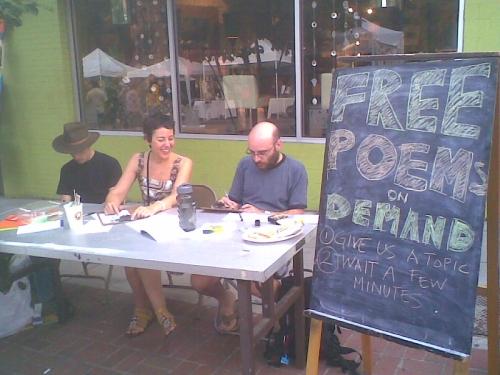

Monday, September 13, 2010
Write-up: FREE POEM Days
FREE POEMS ON DEMAND was a success at the Decatur Book Festival. We collectively wrote more than 100 poems over two days on topics as diverse as: "neon broken arm", "cannibalism", "how to tell your grandmother you're pregnant", and "wow!"
Participants included: me, Jeff Dahlgren, Zac Denton, John Selvidge, Mary Richardson, Michele Rozga, Allison & Ping Pong, and a random stranger who wanted to try her hand at it (she wrote a good poem about "corners").
I got out there around 3PM and wrote nonstop until 8PM. Various people joined me in the task throughout the day. I found these sales slips at Wal-mart that let you write things on the top sheet and it will transfer to the carbon copy on the bottom. We used these sometimes to get an instant copy of the poems we wrote for people. The pad had 50 sheets, but we ran out of sheets about half-way through.
Some people asked for silly topics like Hippopotamus. But some people, you can really tell they needed a poem to get through whatever they were going through. You got to learn a lot about people sometimes, like the woman who asked for a poem about "the end of an affair". Or the older man who asked very genuinely for a poem about "hope".
Those vague words are the hardest to write, (we got "hope", "true love", "life", "determination", "perseverance"). There's an impulse to undercut the subject with cleverness, but if the person looks like they really meant it, then you don't want to do that. You want to write a genuine sincere poem about hope. Now, all you ironic poets out there can smirk all you want, but that is fucking hard.
Overall, though, writing instant poems is fun and easy. It's much easier than writing a real poem simply because nobody expects a good poem to be written in 5 minutes. So if you write a bad poem, that's par for the course. If you write a mediocre poem, that's considered wonderful, fantastic! This way of thinking about it really freed me up to write whatever crap came into my head.
I got so many encouraging responses. One woman even said she will frame it on the wall, and some just said thanks over and over again. One boy said "thanks, i really like it" then later "It's really a good poem". He was so sweet.
Some people had special requirements for their poem. Like this following one, in which I was instructed to include the words turquoise, sun, detritus, monkey, fresh-cocoonut, chanting, hand-spun, and moon:
Turquoise and blue, natural colors
filling up the stream. Nearby
detritus ends up in Detroit
where the monkeys wear suits,
teleconferencing. But here, only
the din of traffic reaches me
as I crack fresh coconuts,
drinking its contents, its
flesh regards me, chanting.
The clouds look hand-spun,
custom made for the moon.
Many people asked for personalized poems, dedicated to someone. Like this one for Elsa, who just turned 2½:
Ode to Elsa and fingers
and O's where Elsa steps
and sunshine swings Elsa's mom
to Elmo here and Elsa there
does hops with Elsa's hair
here there and everywhere Elsa.
And this one for Grant who his father claims never listens to anyone. His father gave me a $10 tip for this poem!
A book of poems
for Grant who doesn't listen.
Nobody listens, though, right?
Grant is listening now
just because. He likes
to talk the big talk.
Talking is when words
come out of your mouth.
Grant is a big boy
so big words come out of
his big mouth. Everything
is quiet now. Silent night.
Perfect opportunity.
It is hard to resist the urge to revise these now. A tweak here or there could make it so much less cringe-worthy, but then again I have to remember it is not about the poems, but the process.
I thought writing poems for 5 hours straight would exhaust me but it just kind of put me in this weird state of mind. At the end of the first day, I was a little bit ecstatic. The second day was less busy, but my mind was also less fresh.
There were many people who wanted to know who we were. "Are you poets?". A lot of interest in Eyedrum was generated from these encounters as well. I thought above all that it was really good for cloistered experimental poets to do this as a way to get out of our own headspace a little. We complain that nobody reads our poems, but I've been surprised by the amount of receptiveness that most people have shown.
There was also someone who asked, unbelievingly, "do you use some kind of template, or formula". No, we don't. That would defeat the whole purpose. If the purpose was to always safely hand the audience a pretty good poem, then that would be a good strategy. But the purpose was to challenge ourselves to go outside of our comfort zones, to risk writing that bad poem, writing 50 bad poems. No, we didn't have a formula or a strategy, and that can be why it's such an awful project or an awesome project, depending on which end of the lens you're looking through
We're thinking about doing it again sometime soon. We need to find a place with a lot of foot traffic in Atlanta, maybe L5P or East Atlanta Village… or Piedmont Park. It would be nice to get a totally different crowd, to see how different the experience is.
Much thanks to Eyedrum Lit Committee for being open to this idea, and to Bill and Amy and the Seen Gallery for opening up their space for us.
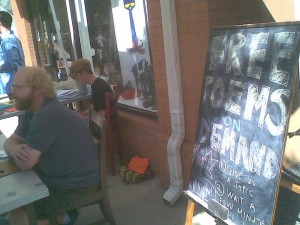
Participants included: me, Jeff Dahlgren, Zac Denton, John Selvidge, Mary Richardson, Michele Rozga, Allison & Ping Pong, and a random stranger who wanted to try her hand at it (she wrote a good poem about "corners").
I got out there around 3PM and wrote nonstop until 8PM. Various people joined me in the task throughout the day. I found these sales slips at Wal-mart that let you write things on the top sheet and it will transfer to the carbon copy on the bottom. We used these sometimes to get an instant copy of the poems we wrote for people. The pad had 50 sheets, but we ran out of sheets about half-way through.
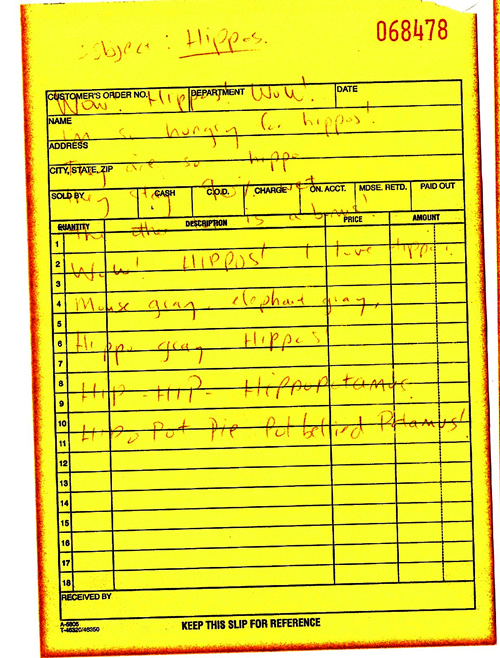
Some people asked for silly topics like Hippopotamus. But some people, you can really tell they needed a poem to get through whatever they were going through. You got to learn a lot about people sometimes, like the woman who asked for a poem about "the end of an affair". Or the older man who asked very genuinely for a poem about "hope".
Those vague words are the hardest to write, (we got "hope", "true love", "life", "determination", "perseverance"). There's an impulse to undercut the subject with cleverness, but if the person looks like they really meant it, then you don't want to do that. You want to write a genuine sincere poem about hope. Now, all you ironic poets out there can smirk all you want, but that is fucking hard.
Overall, though, writing instant poems is fun and easy. It's much easier than writing a real poem simply because nobody expects a good poem to be written in 5 minutes. So if you write a bad poem, that's par for the course. If you write a mediocre poem, that's considered wonderful, fantastic! This way of thinking about it really freed me up to write whatever crap came into my head.
I got so many encouraging responses. One woman even said she will frame it on the wall, and some just said thanks over and over again. One boy said "thanks, i really like it" then later "It's really a good poem". He was so sweet.
Some people had special requirements for their poem. Like this following one, in which I was instructed to include the words turquoise, sun, detritus, monkey, fresh-cocoonut, chanting, hand-spun, and moon:
Turquoise and blue, natural colors
filling up the stream. Nearby
detritus ends up in Detroit
where the monkeys wear suits,
teleconferencing. But here, only
the din of traffic reaches me
as I crack fresh coconuts,
drinking its contents, its
flesh regards me, chanting.
The clouds look hand-spun,
custom made for the moon.
Many people asked for personalized poems, dedicated to someone. Like this one for Elsa, who just turned 2½:
Ode to Elsa and fingers
and O's where Elsa steps
and sunshine swings Elsa's mom
to Elmo here and Elsa there
does hops with Elsa's hair
here there and everywhere Elsa.
And this one for Grant who his father claims never listens to anyone. His father gave me a $10 tip for this poem!
A book of poems
for Grant who doesn't listen.
Nobody listens, though, right?
Grant is listening now
just because. He likes
to talk the big talk.
Talking is when words
come out of your mouth.
Grant is a big boy
so big words come out of
his big mouth. Everything
is quiet now. Silent night.
Perfect opportunity.
It is hard to resist the urge to revise these now. A tweak here or there could make it so much less cringe-worthy, but then again I have to remember it is not about the poems, but the process.
I thought writing poems for 5 hours straight would exhaust me but it just kind of put me in this weird state of mind. At the end of the first day, I was a little bit ecstatic. The second day was less busy, but my mind was also less fresh.
There were many people who wanted to know who we were. "Are you poets?". A lot of interest in Eyedrum was generated from these encounters as well. I thought above all that it was really good for cloistered experimental poets to do this as a way to get out of our own headspace a little. We complain that nobody reads our poems, but I've been surprised by the amount of receptiveness that most people have shown.
There was also someone who asked, unbelievingly, "do you use some kind of template, or formula". No, we don't. That would defeat the whole purpose. If the purpose was to always safely hand the audience a pretty good poem, then that would be a good strategy. But the purpose was to challenge ourselves to go outside of our comfort zones, to risk writing that bad poem, writing 50 bad poems. No, we didn't have a formula or a strategy, and that can be why it's such an awful project or an awesome project, depending on which end of the lens you're looking through
We're thinking about doing it again sometime soon. We need to find a place with a lot of foot traffic in Atlanta, maybe L5P or East Atlanta Village… or Piedmont Park. It would be nice to get a totally different crowd, to see how different the experience is.
Much thanks to Eyedrum Lit Committee for being open to this idea, and to Bill and Amy and the Seen Gallery for opening up their space for us.
Labels:
free poems,
free poems on demand,
friends,
fun,
mypoetry,
performance,
poetry
Saturday, July 31, 2010
Time of the Doves
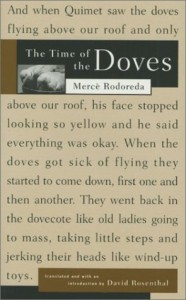 I read this book for the Spotlight Series (which puts the spotlight on small press publishers by having bloggers read and review a book by a small press that they have chosen to feature for that month. The current spotlight is on Graywolf Press).
I read this book for the Spotlight Series (which puts the spotlight on small press publishers by having bloggers read and review a book by a small press that they have chosen to feature for that month. The current spotlight is on Graywolf Press).Time of the Doves
by Mercè Rodoreda
"And as he was talking he'd run his fingernail along the crack in the table and dig out breadcrumbs that had gotten stuck there, and it seemed strange to me that he'd do something I did sometimes but that he'd never seen me do."This book is about the experience of something big in the body of something small, small as a woman named Natalia. Because all big experiences, even marriage, even children, even war, even despair—because all of these big things are also little things, or it comes one little thing at a time—doves and eggs and the name Colometta or the smell of hydrochloric acid.
And though something big can be forgotten, can be silenced, can be inside deep like termites going from inside out instead of outside in, something small like blue lights or a cork or a picture of some lobsters, they stay with you in tiny shards just quiet-like. This book is about how to forget them.
"I'd learned to read and write and my mother'd gotten me used to wearing white clothes. I'd learned to read and write and I sold pastries and candy and chocolates and bonbons filled with liqueurs. And I could walk through the streets like a human being surrounded by other human beings. I'd learned to read and write and waited on people and helped them…"All these small things are like a cork to stop up the big things but the big things get through anyway. The things not said, because it's too painful, or simply because our narrator is not very eloquent. She's in-eloquent not because she's stupid but because she's not totally aware of her feelings, at least through most of the novel. But that doesn't mean she's not able to move you, the reader, all the more for it.
So that's what this book felt like—just tiny experiences that slowly build up, with a whirlwind of characters and things and thoughts all written in a style that seems slightly dizzying because the sentences are long but not complicated, they are long in the way a Frank O'Hara poem is long, where you run out of breath by the end of the sentence with that inexplicable breathless urgency.
I thoroughly enjoyed this book and was glad that Spotlight on Small Presses gave me the extra nudge in the rear-end to finally read this wonderful Graywolf Press book (since it was already on my "to read" list).
Saturday, June 12, 2010
Lay hold of that symbol
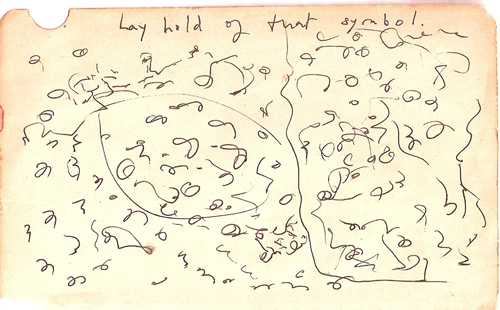
September 15th, 1917
“You have the chance as far as it is at all possible, to make a new beginning. Don’t throw it away. If you insist on digging deep into yourself you won’t be able to avoid the muck that will well up. But don’t wallow in it. If the infection in your lungs is only a symbol, as you say, a symbol of the infection whose inflammation is called X and whose depth is it’s own deep justification, if this is so, then the medical advice (light, sun, rest) is also a symbol. Lay hold of that symbol.”
from Kafka's Diary
Monday, May 3, 2010
2666
Reading 2666 is like trying to appreciate the Sistine Chapel from up close. I wanted constantly to step back in order to get some bigger-picture perspective, and because it is so hard to do this with a work of literature (basically you have to contain the whole thing in your mind and try to imagine it from afar) it makes certain sections (let's say almost all of it) frustrating, or slightly unsatisfying. But by the end, you start to see some connections, though they are not simple connections. It is more like a feeling of a worldview, than any kind of easy conclusion. If there is any big picture, it is very hard to encapsulate without trying to re-tell the whole thing. Or drawing rather meaningless diagrams, as I have done below:
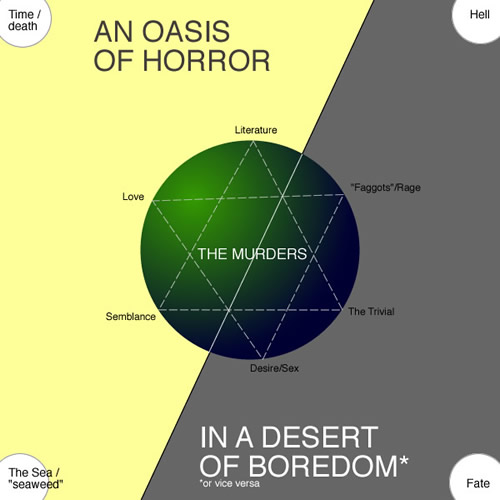
This makes sense to me, even though I feel like I'm still leaving out a whole bunch, and even though it might not make any sense to anyone else.
I don't think it is a great novel, although I think its strongest point is creating an internal logic so full that it approaches madness. I think the book lacks some basic things like joy, humor (there was humor, but not the type of humor that sustains one in the act of reading), and characterization. The people in the book seem flat and do not develop; they are almost like chess pieces Bolaño uses to illustrate his points. On the plus side, the book is unlike any other book I've read and its strengths are very different from those that I'm used to. I feel that this is a very difficult book to think about in terms of "good" or "bad". I honestly did not enjoy reading most of it, but I did feel compelled to continue. There is a sense that I am not immersed in the novel's world, but am only reading a synopsis of 'what happens', almost like reading a list of ingredients. There is something enticing about lists to me, perhaps that's why I kept reading.
2666 Group Read Experience:
I was excited to read 2666 partially because of the Group Read aspect. I like that there is not one forum for discussion, but rather everyone uses their own modes (whether it be twitter, blogs, forums, GoodReads, etc.). But while I found a lot of interesting perspectives, the book seems so open-ended that I started to not really get too much out of these perspectives, but instead felt an overwhelming sense of becoming a book-hermit. This book especially, while going outward, has a spiraling down and inwards feeling to me, akin to becoming slightly insane and illogical. What I didn't expect was that I liked not explaining or reading others explanations the more I got into the book, and felt a sense of guardedness towards the experience of reading rather than an expansion outwards. My gut feeling is that this would have been different with another book. I can't explain why. I remember after finishing The Brothers Karamazov, that I wished to discuss it with people. But with this book, I didn't have that feeling at all. Partly, I think any discussion of this book—which seems to have an infinite number of nodes for making connections—would be at least 80% bullshit, but maybe that's the cynic in me speaking.

This makes sense to me, even though I feel like I'm still leaving out a whole bunch, and even though it might not make any sense to anyone else.
I don't think it is a great novel, although I think its strongest point is creating an internal logic so full that it approaches madness. I think the book lacks some basic things like joy, humor (there was humor, but not the type of humor that sustains one in the act of reading), and characterization. The people in the book seem flat and do not develop; they are almost like chess pieces Bolaño uses to illustrate his points. On the plus side, the book is unlike any other book I've read and its strengths are very different from those that I'm used to. I feel that this is a very difficult book to think about in terms of "good" or "bad". I honestly did not enjoy reading most of it, but I did feel compelled to continue. There is a sense that I am not immersed in the novel's world, but am only reading a synopsis of 'what happens', almost like reading a list of ingredients. There is something enticing about lists to me, perhaps that's why I kept reading.
2666 Group Read Experience:
I was excited to read 2666 partially because of the Group Read aspect. I like that there is not one forum for discussion, but rather everyone uses their own modes (whether it be twitter, blogs, forums, GoodReads, etc.). But while I found a lot of interesting perspectives, the book seems so open-ended that I started to not really get too much out of these perspectives, but instead felt an overwhelming sense of becoming a book-hermit. This book especially, while going outward, has a spiraling down and inwards feeling to me, akin to becoming slightly insane and illogical. What I didn't expect was that I liked not explaining or reading others explanations the more I got into the book, and felt a sense of guardedness towards the experience of reading rather than an expansion outwards. My gut feeling is that this would have been different with another book. I can't explain why. I remember after finishing The Brothers Karamazov, that I wished to discuss it with people. But with this book, I didn't have that feeling at all. Partly, I think any discussion of this book—which seems to have an infinite number of nodes for making connections—would be at least 80% bullshit, but maybe that's the cynic in me speaking.
Friday, April 30, 2010
The Bus Stop
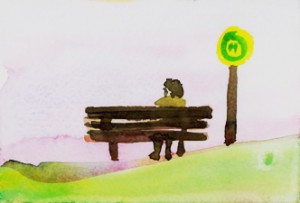
Another great Radiolab podcast. It's not one of their hour-long shows; this one is just under 15 minutes and is well worth listening to. It hits close to home for me because my recent trip to Hong Kong was partially to visit my grandfather, who now lives in an old folk's home. His memory is almost gone now, though he has good days and bad days. He acts like a quiet child, and is very fond of eating. At night, they have to tie him up because he often gets up to steal food from the kitchen, and his balance is not well, so he could easily fall.
Sunday, April 25, 2010
Festival
Festival celebration footage I shot in Hong Kong.
Labels:
celebration,
dance,
documentary,
festival,
hong kong,
lion dance,
martial arts,
myfilm
Sunday, April 11, 2010
Micro Texts
Working on a visual poetry project with the help of Nisa Asokan and her microscope. Here are some of the images we captured from household items.





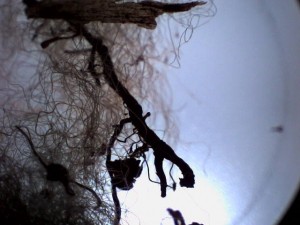










Wednesday, March 10, 2010
Tuesday, February 23, 2010
On Usefulness
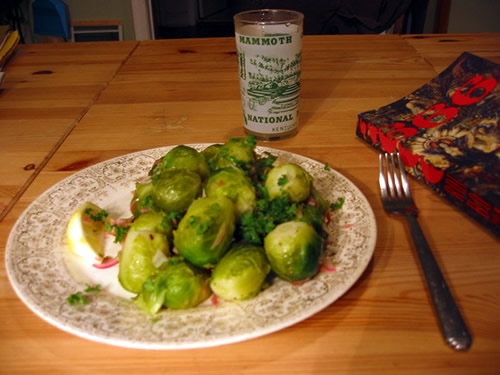
Is 2666 a useful book? I set out to test its usefulness last night when I used one of the recipes provided in the Part About Fate, when Mr. Seaman preaches about usefulness to his congregation. And I quote:
I see lots of fat people in this church, he said. I suspect few of you eat green vegetables. maybe now is the time for a recipe. The name of the recipe is: Brussels Sprouts with Lemon. Take note, please. Four servings calls for: two pounds of brussels sprouts, juice and zest of one lemon, one onion, one sprig of parsley, three tablespoons of butter, black pepper, and salt. You make it like so. One: Clean sprouts well and remove outer leaves. Finely chop onion and parsley. Two: In a pot of salted boiling water, cook sprouts for twenty minutes, or until tender. Then drain well and set aside. Three: Melt butter in frying pan and lightly saute onion, add zest and juice of lemon and salt and pepper to taste. Four: Add brussels sprouts, toss with sauce, reheat for a few minutes, sprinkle with parsley, and serve with lemon wedges on the side. So good you’ll be licking your fingers, said Seaman. No cholesterol, good for the liver, good for the blood pressure, very healthy.
Verdict: Yes, 2666 is indeed a very useful book. I was able to make the above dish without too much effort. Although I had some brussel sprouts lately that were much more delicious, it would probably not be fair to compare the usefulness of 2666 with a proper recipe book. The ones I made last night were also very good, slightly lemony and oniony, although my stomach felt a bit weird after eating way too much of it.
I'm not the first one to do this, I found another blog post and their photos look much more fingerlicking than mine :)
Labels:
2666,
brussels sprouts,
group read,
reading,
Roberto Bolano,
usefulness
Monday, February 15, 2010
The Part About Amalfitano
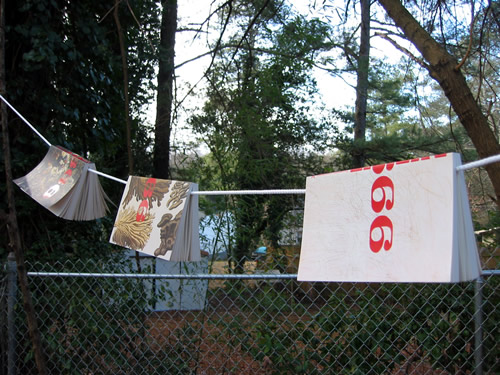
There's a Group Read going on for the book 2666, and I've been following along on the forums and stuff, but here is my first blog post about it. I've never read Bolano before and I find it alternating between engaging and frustrating. Often, I have no idea what he is trying to get at mainly because there is just so much there. He throws so much at the book (it is 900 pages long) that it seems inevitable to make connections, but are the connections really there? Or is it just the result of there being so much there?
I kept most of my comments on The Part About the Critics on the forums or to myself, but here are a few things I noticed about the Part About Amalfitano (please excuse the messiness of these notes)
Parallels with Part 1: Right off we start in a similar territory as part 1. Instead of the critics going from Europe to Latin America to look for Archimboldi, we have Lola going to ??? looking for the poet. Interesting: Amalfitano says there is no way she really met him since he introduced him to her. So (knowing this) the long passages where she writes of meeting him and making love to him at a party read to me almost like one of the dream sequences. Also: parallel with part 1 in that a woman (Lola in part 2, Norton in part 1) is leaving/abandoning a man (or 2 men, in part 1) and writing to him/them from the new location.
What strikes me about these looking-for-a-writer scenes: these people don't know who they are, and they are invested in this other thing that defines them, because they can't define themselves. The critics write ABOUT Archimboldi's writings. It seems like a modern condition Bolano is highlighting, wherein people's identity is so lost and so caught up and dependent on others... but it's dependent on others not in a close-knit-community kind of way... there is a very ego-centric, selfish neediness in their searches and reliance on some kind of literary hero.
Character notes: we know so little about these characters... who is Lola and what is her background, why did she suddenly leave so mysteriously? Who is Imma and what is her motivation for going along with Lola? We know very little about Amalfitano, though this section is about him... it gave him a page or two and then went head first into Lola's adventures. Only later in the section do we get more into his head. Also: Lola is an interesting choice of name... traditionally Lola is a name of a prostitute or a drag queen... just based on many songs with the name Lola in it... I've actually thought about this before encountering the name here. It's interesting here considering Lola's relationship with the poet is through sex, and also how she implicitly allowed the guy who hangs out at the cemetery to pay her for sex.
Stylistic notes: why is part 2 suddenly devoid of paragraph breaks? Except in the last page, where Yeltsin speaks in the dream to him, that is the only paragraph break.
"Madness is contagious"
Neighbor's fort-like walls w/ broken glass on top. This part compares Amalfitano to a medieval lord. I found this metaphor kind of curious, and out of nowhere, but Bolano returns to it a few times.
A quote:
Anyway, these ideas or feelings or ramblings had their satisfactions. They named the pain of others into memories of one's own. They turned pain, which is natural, enduring, and eternally triumphant, into personal memory, which is human, breif, and eternally elusive. They turned a brutal story of injustice and abuse, an incoherent howl with no beginning or end, into a neatly structured story in which suicide was always held out as a possibility. They turned flight into freedom, even if freedom meant no more than the perpetuation of flight. They turned chaos into order, even if it was at the cost of what is commonly known as sanity.
p. 189. If you didn't know he was talking about Amalfitano's ideas on jet lag, you'd think he was talking about the role of novels like 2666 here.
Testamento geometrico:
"three books 'each independent, but functionally correlated by the sweep of the whole'" (sounds like 2666, with its 5 independent parts)
"the friends' last names had been printed in capitals while the name of the man being honored was in small letters." (ego? sounds familiar to the Critics)
Book hanging on line = symbolism too much? i.e. literature meets the elements/real world. For those of you wondering, yes I did hang 2666 on the clothesline in the photo above. It seemed a good tribute.
"We're not animals" Rosa says, about the book hanging on line
"I take it back" p 191, weird rhetorical device here. Anyone get this?
Random thought: I think Bolano is trying to say you can look to art and literature for your answers all you like, you can worship art and forget what you were looking there for to begin with, you can become a professor of literature and scrutinize a piece of text for years, you can even follow the writer, the originator of the art, the questions, but there are some things--in the real world--that you can never understand. (like the murders)
chincuales - 1 flea or bedbug bites 2 a restless scratcher 3 a restless mind
Books It is interesting that in the first part about the critics, we don't get any sense what Archimboldi's books are like. And yet in the second part, we get the nitty gritty of 2 books Amalfitano is reading. At least more nitty gritty than the ones mentioned in part 1. The book on Araucanians is described in detail in terms of how Amalfitano is reading it, and I found especially interesting his imagination while reading it, imagining even scenes of the writer trying to publish the book and get a discount (which goes into this region of is-it-imagined or did-it-really-happen-this way). p224. The other book of course is the geometry book, which he hangs out in the elements (also a way of reading?). And which pervades his thoughts in a totally different way, perhaps influencing him to draw geometrical shapes with names of thinkers at different intersections of these diagrams. Maybe Bolano is highlighting the way Amalfitano is "reading" these books and how it is different and unconventional compared to the way the critics are reading their books (which aren't even worth mentioning in depth). Perhaps Amalf. is the active reader as envisioned by Cortazar, and referenced on p. 224. And then he goes on to imagine Kilipan to have not existed at all, he imagines him as all these other people writing under the name Kilipan. This person who was just made so real to us a second ago by the same imagination.
Young Guerra:
Not sure what I think of this yet. Or how he fits in. He's a little off his rocker. But then so is Amalfitano. Is it just 2 ways of being mad/dealing? Lola was a little mad too.
Sunday, February 7, 2010
Naw! Thee!
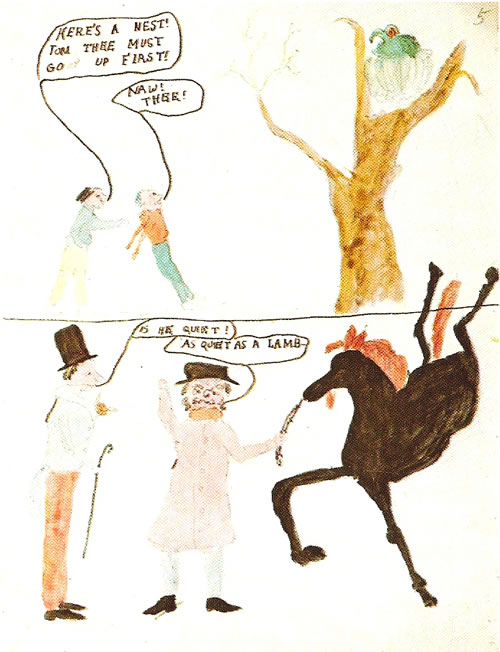
I found this postcard yesterday. Caption on back reads:
Story-picture drawn by Lewis Carroll (Charles L. Dodgson) at the age of 9 (1841). The Rosenbach Foundation Museum, 2010 DeLancey Place, Philadelphia.
Sunday, January 24, 2010
Old Photos
Some photos I found at Kudzu Antiques recently:
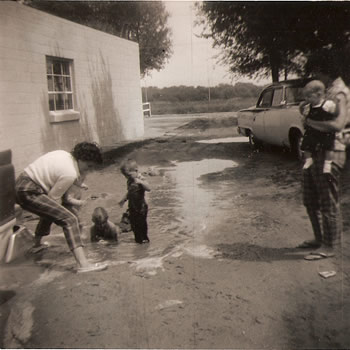
I love how it looks like the mom is lowering the kid into the puddle. "Go play with your brothers in the mud!" The photo is dated September 1963.
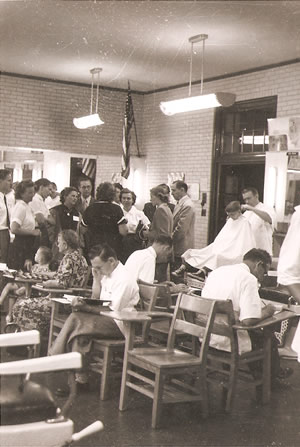
Anyone have any ideas where this could have been taken? Seems like a nice scene.
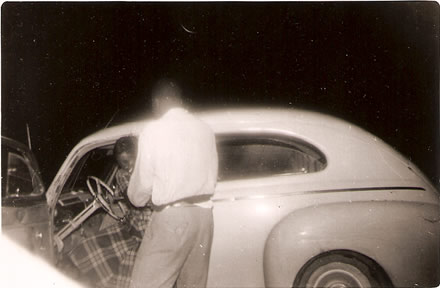
Photo dated February 1952, San Antonio Texas.
Now for some animals:

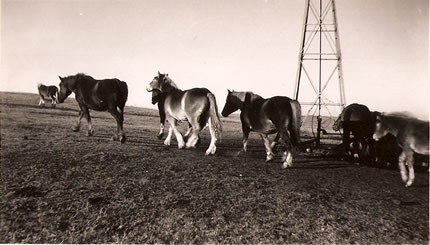

I love how it looks like the mom is lowering the kid into the puddle. "Go play with your brothers in the mud!" The photo is dated September 1963.

Anyone have any ideas where this could have been taken? Seems like a nice scene.

Photo dated February 1952, San Antonio Texas.
Now for some animals:


Tuesday, January 19, 2010
To An Artificer
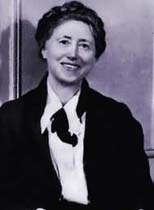
Not of silver nor of coral
But of weather-beaten laurel
Carve it out.
II
Make a body long and thin
And carve hairs upon the skin.
Make a snout.
III
On the order of a tower
Faintly wrinkled like a flower
On the paws
IV
Carve out heavy feline toes
Make each claw an eagle's nose.
Carve great jaws.
—Marianne Moore
Bonus: this from a letter Marianne Moore wrote to Robert McAlmon on September 2, 1921, found on page 179 of her Selected Letters:
You are right; the intellect has not the last word today—any more than it ever had. Sophistication is no match for nature and as I have written Bryher, I have a respect for nature, blind or conscious. The blind instinctive behavior of old fashioned unenlightened society has many advantages over our conscious behavior today; psychoanalysis is a fascinating study and in some ways a useful one but it pre-empts too much of the mind and people tend to feel that a situation analyzed is a situation solved. In rapping marriage on the head as it sometimes does, it is unscientific—when you consider the evolution of the marriage relation and the instinctive tendency to idealize it, and to explain religion away is ludicrously superficial. Religious conviction, art, and animal impulse, are the strongest factors in life, I think, and any one in the ascendant can obliterate the others. We see different phases of them, for example, Bryher's interest in education and in securing freedom to the race, are a tangent of religion. Religion may be pigeonholed as a transference but religious conviction in operation has always made room for itself over the head of every obstacle. It is apparent that sincerely religious people are contented and are not easily at their wit's end.
Labels:
animals,
intellect,
marianne moore,
nature,
poetry,
poets,
psychoanalysis,
religion
Wednesday, January 6, 2010
2009 Reads
Novels
An Episode in the Life of a Landscape Painter by Cesar Aira, and...
How I Became a Nun by Cesar Aira
in which Argentinian writer (and we all know about them Argentinian writers) takes us on adventures involving surreal shape-shifting narratives, philosophical insights, and much attention to language (yes, it's well translated).
The Notebooks of Malte Laurids Brigge by Rainer Maria Rilke
in which I emerge from a fog of folklore and historic tangents infused w/ personal memories of a little boy Malte (read: Rainer in feeble disguise) all grown up and wandering the streets of Paris having excessive thoughts on death, poverty, and ghosts. WTF, Rainer? Is this really what you call a novel? Whatever, at least it's fucking great.
A High Wind in Jamaica by Richard Hughes
in which a bunch of pirates end up accidentally kidnapping a bunch of kids. Poor pirates. These kids are merciless. Forgive them, for they know not what they are doing. I recommend this book for people who love kids. Bonus: many animals, death, and various other perfundities. Is that a word?
Two Serious Ladies by Jane Bowles
in which two serious ladies engage in various random acts of nonconformity in order to escape from their dull lives. Many strange people met on the way. Funny and charming and sad and indeed.
Frances Johnson by Stacey Levine
in which one, Frances Johnson, is introduced wherein she is worried about various contrivances say her warts or some other thing or where oh where her bicycle takes her. A very experimental novel, but also a touching and soft one too, which is nice to know: that that is still possible I mean.
Stoner by John Williams
in which a most boring college professor's life is recounted in bibliographic and chronological order which sounds really boring but actually I have no idea how it snuck up on me and was just the most powerful book ever and made me cry and cry and cry.
A Tree Grows in Brooklyn by Betty Smith
in which a little girl grows up in the slums, and finds ways to be positive around every corner, and somehow almost always evading sentimentality.
Madame Bovary by Gustave Flaubert
in which Gustave my man Gustave writes his tercid prose is that a word tercid? does it mean turd-like? Well, no matter, this book that bowled me over with passage after passage, is about a woman who is never satisfied and almost never happy. Sweet lord, what a book.
Moviegoer by Walker Percy
in which something happens in New Orleans inside of the head of Binx Bolling who happens to have some ideas in there as well, and they knock around, and this book came out. Funny, I remember hardly anything about this book anymore.
Non-Fiction
The Story of Mary Maclane by Mary Maclane
in which Mary Maclane, a nineteen year old girl stuck in Butte Montana in 1901, writes a sort of definition of herself... or a manifesto, of sorts. She is a genius! She has a "peripatetic" philosophy inside of her "wooden heart". She has a crush on a lady friend. She worships Napoleon and has 17 portraits of him.
Cries Unheard: Why Children Kill: The Story of Mary Bell by Gitta Sereny
in which the true story of Mary Bell, an 11-year old girl who killed 2 boys ages 3 and 4 many years ago, is finally revealed through intense writing and recounting of the events that followed the events preceeding, as well as through personal interviews with Mary Bell, who is now out of jail and has children of her own. Did I mention "intense"? This book is enough to give you a fever, and make you think twice about why children do the things they do. Was Mary Bell evil? Or was something else at work here?
Flow: The Psychology of Optimal Experience by Mihaly Csikszentmihalyi
in which the secret of happiness is revealed to be a state of mind achieved through unriveted attention, well-defined goals, clear feedback, and the perfect level of difficulty (not too hard, not too easy). A very interesting book, which doesn't just stop at the science, but includes very human elements.
Breaking the News by James Fallows
in which the horrid state of journalism is detailed in every way possible. Just when you thought it couldn't get worse, you realize that this book was written during Clinton's era, and that things have gotten much worse with Fox News, Reality TV, and a bunch of other things that I don't even want to think about. Someone kill me now.
Poetry
Selected Poetry of Rainer Maria Rilke translated by Stephen Mitchell
in which Rainer Maria Rilke is very poet-like in the traditional sense of being inspired by angels while holing up in a castle for ten years. The Duino Elegies blew my mind, and I can't believe I had not discovered Rilke until 2009. Get this translation, especially, it is superb, if I can say that.
The Making of Pre by Francis Ponge
in which Francis Ponge, being French, labors over the phenomenological atoms of rivers and plains, coming up with a meadow on which theoretical swords are crossed and yet one is felled in practice. Mr. Ponge, you killed me on the Pre, but this is a very interesting read. Bonus: lots of words vehemently crossed out.
Isle of the Signatories by Marjorie Welish
in which nobody else got it but I did and started reading it all the way from the bookstore till I got home. Something about words or signs and what they pointed to, and how pretentious that is, and how like an academic with a tenure track going round and round. But more visceral, in my opinion, more stabby.
The Romance of Happy Workers by Anne Boyer
in which no word is the blip of its own passing, and Anne Boyer is a woman of sufficient means moving over the page with slight curtsies because, well, just because. I think I'm turning into Dawn with this review.
Monday, January 4, 2010
Subscribe to:
Comments (Atom)
